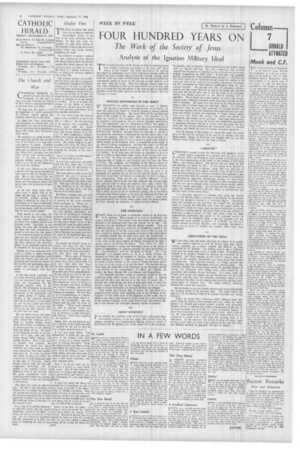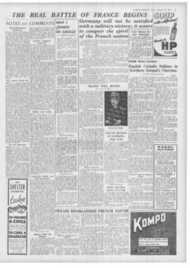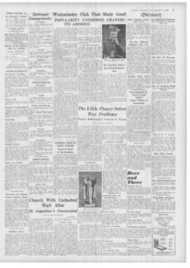Page 4, 27th September 1940
Page 4

Report an error
Noticed an error on this page?If you've noticed an error in this article please click here to report it.
Tags
Share
Related articles
Twenty-five Years In The Faith Prinknash Keeps A Happy...
New Rubrics Cause Changes
Blessed Pius
New Saints For England And Irish Republic
French Archbishop Preaches At Selby
Column
7
DONALD ATTWATER
Monk and C.F.
THE twenty-ninth day of September is the feast of blessed Michael the Archangel; it is also the anniversary of the death in 1918 of Dom Umberto Bertini, Benedictine monk and chaplain in the British army. I am happy to take the opportunity provided by this column of speaking
of one whose memory is held in benediction by all who came under his ministration.
Umberto Bertini was born in Italy of Italian parents in 1885, but lived all but the first six months of his life in this country; he became a monk of Farnborough Abbey, and was ordained priest in 1913. When war broke out in the following year Father Umberto was staying at Clervaux Abbey in Luxemburg. He fled across several German provinces and at length arrived at the abbey of Einsiedeln in Switzerland, where grave irregularities were discovered in his papers and he was advised to go to Rome and get them put right. He went—from the fryingpan into the fire: for on account of those irregularities he found himself again in dangerthis time as a " deserter " from the Italian army.
He was drafted to a military hospital as an orderly, but ufter some months managed by skilful " wangling " to get transferred to the British Army's chaplains' department. In 1917 he was posted to those few batteries of artillery which then represented Great Britain on the Italian front and there, in the mountainous wilderness of the Carso, I met Father Umberto. From the first I was impressed by his vigorous independence and enthusiasm; of his personal appearance I now remember little: he certainly looked like an Italian and a priest and, though he wore his uniform with an air, not at all like a soldier.
When 1 first assisted at his Mass, in a battery position, 1 was surprised to sec he wore a large full chasuble, and later I discovered that he added to the burden of his kit a Benedictine habit, which he put on whenever opportunity allowed. These were outward and visible signs of that immersion in the life of deatcation and worship that was so characteristic of him. Never did he voluntarily -drain from celebrating Mass, and from his munastic clothing till a few days before his death he never failed, even in war, to say the day's office, however late he had to begin.
During the fighting of the early autumn Father Umberto's surprising mobility, courage under fire, and devotion to his small but scattered flock made a deep impression. He would turn up at any time of day or night, cheerful and encouraging and giving the sacraments in trenches and dugouts, by bombarding guns, under shell tire: " a hell of a man," was a Presbyterian gunner's comment.
Soon the British troops were ordered to Egypt and tot several days were quartered in villages out of the line. After three months of unmitigated hardship and danger many officers and men most control of themselves, and Father Umberto had a trying time, but the flame of his faith and love burned as steadily as ever. He tracked down the indifferent and the backsliders, and even gave instruction to non-Catholic enquirers, putting each under the care of a reliable Catholic " to continue the treatment." Eventually not a single Catholic went unshriven of unhouseled : Father Umberto interpreted his chaplain's faculties very liberally indeed and at all hours of the day he might be seen in the parish church giving communion to stray sheep—somewhat to the surprise, he told me, of the local paracco.
At midnight on October I0 our train pulled out of the station on its long journey to Taranto. I saw Father Umberto for the last time at 11.55 ; the Blessed Sacrament was in his hand and a man was kneeling between the railway metals.
In the disastrous anal, of Caporetto Father Umberto had a narrow escape from capture and caught a pneumonic chill from which he never properly recovered. He got to work again during the spring and summer of 1918, and established a kind of retreat-house for soldiers at Arquata Scrivia. In September he came home on leave and within a few days was taken ill at Boscombe; and on the feast of the titular saint of his monastery, St. Michael, he died, in his thirty-fourth year.
Where most were so excellent it is not gracious to make a distinction between chaplains, but of the many I met none had more wisdom, energy and pluck than Umberto Bertini. I knew him for only a few weeks, but to-day, twenty-three years afterwards, his personality is still vivid to me —and I cannot possibly give an adequate explanation of the impression he made. We sometimes use the word " holy " rather lightly: of Father Umberto I would use it with careful deliberation. He had, so far as I know, no experience outside his monastery, and only about seven years of that; then he was pitchforked into a strange world of infinite opportunity—and he lived up to that opportunity. He was a fine example of the practical qualities, of the ability to deal with men and affairs outside the cloister, that is so often bred by the contemplative life : one was reminded of the missionary monks of the Dark Ages, the lesson of the manner 01 whose achievements is not the least of the things we might fruitfully ponder to-day. Nor did his work and personality escape the notice of those not directly subject tc his spiritual ministry, and they were never prompted by any word or action of his to say, " 1 like your R.C. padre. He's such a man of the world "; they admire him for quite other qualities.
Umberto Bertini was tried under St. Benedict's secona degree of humility, " that a man love not his own will or delight in fulfilling his own wishes "; be did not live till death in his monastery, but was called to " carry out in his deeds that saying of the Lord, I came not to do mine own will but the will of Him who sent me.' " And we may believe without presumption that he has his reward.
blog comments powered by Disqus









